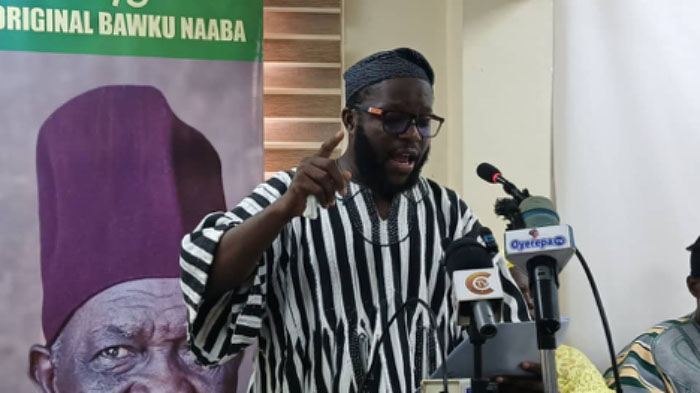Dr. Issah Imoro
The Mamprugu Youth Association has called on the government, especially stakeholders engaged in the ongoing peace process between the Mamprusis and Kusasis in the Bawku conflict, to refrain from taking sides in order not to worsen the crisis.
Speaking at a press conference yesterday in Accra, Spokesperson for the Mamprugu Youth Association, Dr. Issah Imoro said the conflict between the two ethnic groups should be settled without political and external interference.
Dr. Imoro mentioned that following the alleged acts of violence perpetrated by the Kusasi youth, the Inspector General of Police visited Bawku and apologised to the Kusasis, whom they claimed attacked and vandalised several police and state installations, but refused to visit the Mamprusis who are key stakeholders.
The group, therefore, described the conduct of the Inspector General of Police (IGP), Christian Tetteh Yohuno in Bawku as a grave error in judgement, which in their view exposes the advice he might have received prior to his visit to Bawku.
The group therefore described the IGP’s apology to the Kusasi people as “biased and unprofessional, as it emboldened the Kusasi youth to perpetuate more crime.”
Dr. Imoro said the IGP’s apology severely erodes the confidence of the police officers in the Bawku area, exposing them to further attacks given the challenges they are facing, leaving the comfort of their homes and families to serve and protect lives and property in the area.
He said while the Mamprugu youth recognise the inherent right of every community to pursue its economic activities in safety, the creation of a parallel market by the Kusasi people has not been helpful, as elements within the ethnic group’s youth have engaged in acts of intimidation and coercion with intent to deny people access to the Kusasi market, wrongly tagging them as Mamprusis and their allies.
“Disturbingly, this aggression has extended beyond ethnic profiling to levels that can best be described as domestic terrorism. These same Kusasi youth have forcibly prevented their own Kusasi kin, members of other ethnic groups, and international traders, particularly from Burkina Faso, Niger and Togo, from accessing the established Bawku central market which provides revenue to the state.
“These blatant acts of economic blockade and ethnic targeting, often occurring in plain sight of law enforcement officers along critical routes like the Bawku-Bolga-Pulimakom and Bawku-Kulungungu international roads, paint a disturbing picture of a breakdown in law and order and public safety,” he added.
The group further said attempt by any group to arrest Naa Sheriga Alhaji Seidu Abagre, would be resisted as it amounts to injustice, contempt of court, a violation of binding court rulings, and a breach of his fundamental human rights.
He also stated that attempts by the Ghana Police Service to restore order and ensure freedom of movement along the Bawku-Bolga-Pulmakom international road by preventing attacks and harassment of innocent citizens have been met with violent resistance by the Kusasi youth.
That, he explained, has tragically resulted in the loss of life and subsequent coordinated armed attacks by Kusasi youth on multiple police installations, including the burning down of the residence of the Divisional Police Commander, sections of the Bawku Police Barracks, the Binduri Police Post, and the attacks on Pusiga Police Station, as well as the residences of Members of Parliament, Mahama Ayariga and Laadi Ayamba.
The group also demanded the immediate resumption of armed escorts on the Bawku-Bolgatanga-Pulmakom and Bawku-Kulungungu highways to restore the free movement of people and goods, in order to safeguard lives that are currently under severe threat, while calling on state actors, particularly the police, to desist from paying attention to only one party of the conflict in an attempt to meet their demands.
“We call on the media and all stakeholders to desist from lumping all Bawku youth in these acts of terrorism committed by the Kusasi youth. The facts show that it is the Kusasi youth who are engaged in these acts of violence against the state, and they have actually publicly accepted this fact,” he added.
By Ebenezer K. Amponsah


